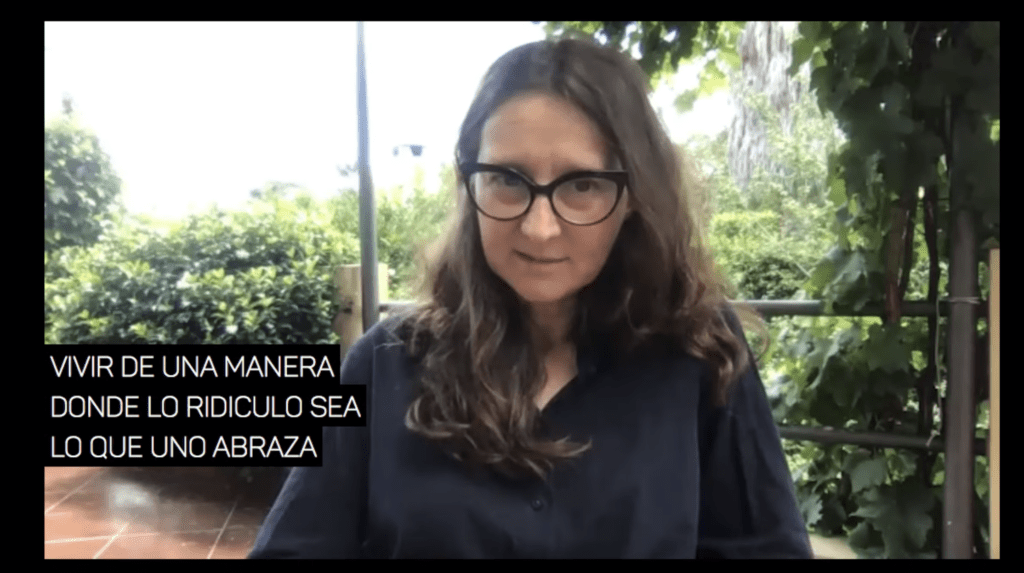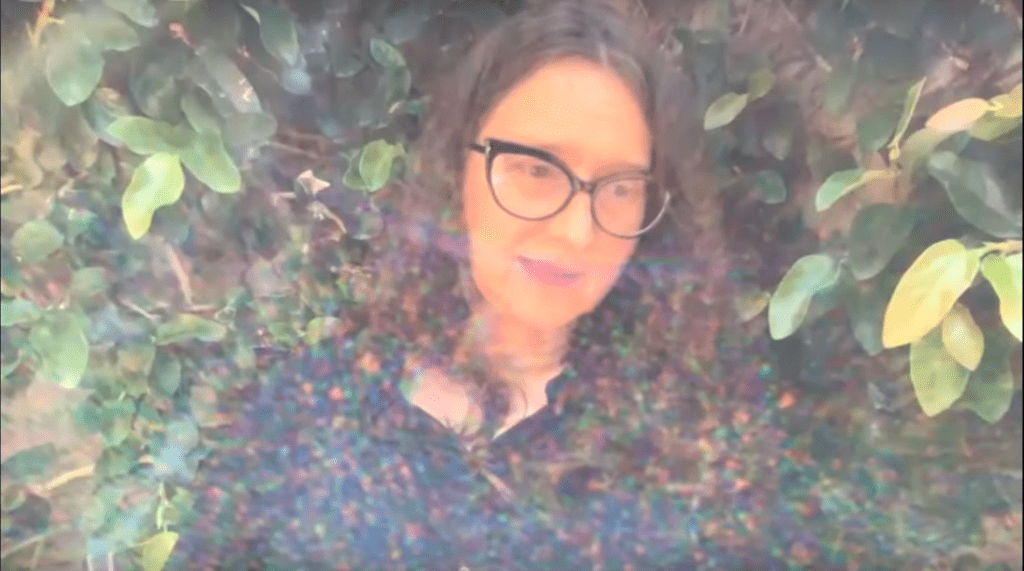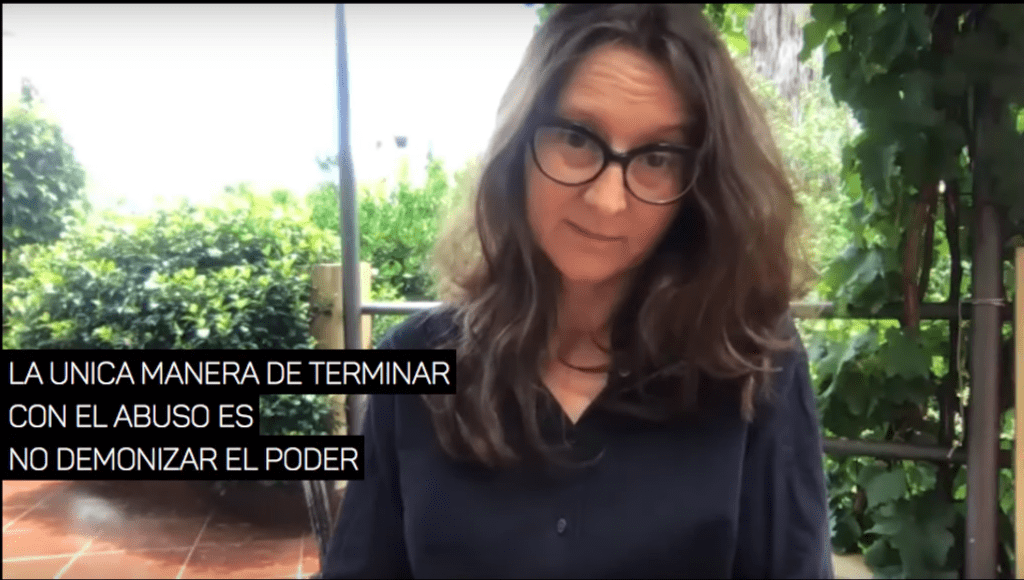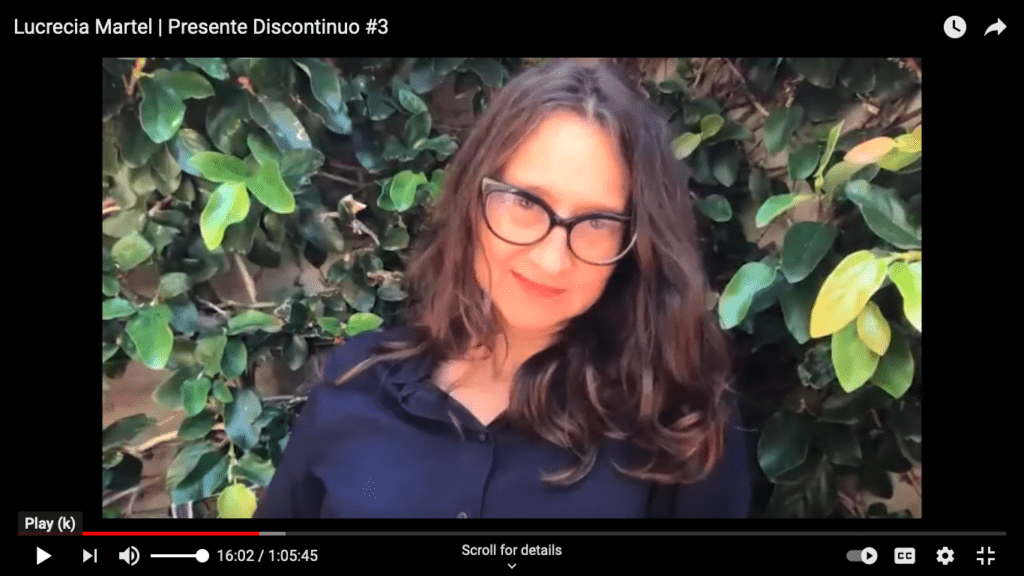How to Sidestep Phallic Imperatives According to Lucrecia Martel
by: Karen Sztajnberg , October 5, 2023
by: Karen Sztajnberg , October 5, 2023
‘I don’t want to submit myself or feel like I own anything.’ (Lucrecia Martel 2020)
*
In her online talk with philosopher Germán Rua for the Andreani Foundation, titled Presente Discontínuo [Discontinuous Present] (2020), Argentine filmmaker Lucrecia Martel repeatedly brings up the term bellicose, easily interchangeable with phallic in this context, to talk about hegemonic storytelling. A long-time detractor of stories that face off protagonist and antagonist to an inevitable warlike unfolding, her few features present neither redemption, nor atavist overcoming through an escalation towards triumph. Believing that it is important to mobilise increasingly desensitised audiences in other ways, Martel deems sharing a humorous sense of inadequacy as necessary. Scholars such as Deborah Martin, Gerd Gemünden and Oscar Jubis have thoroughly analysed Lucrecia Martel’s taut and impactful filmography. I will instead focus on where this online mediatic event fits into her career and what it bestows upon a viable feminist landscape in the current zeitgeist. By finding the points of confluence between her as a respondent to Rua and as a filmmaker whose ideology remains firmly grounded in anti-dominance interpersonal politics, I will claim that her aesthetic project extends well into her discursive stance.
Martel wraps up this webcast by equating humour with strength, and affirms that few have psyched themselves up to realise that philosophy is good for laughing at oneself and ‘destroying it all’. It is almost as if she parts with her audience by stretching one hand to the human need for self-irreverence, another to the power of maelstrom to fertilise the soil anew, at a historic moment when the world screeched to a pandemic halt. If destruction holds the potential for change, so does looking at oneself with a sense of ridicule.

But let’s see how she gets there.
It is December 2020, and the Covid-19 pandemic rages in Argentina. Coincidentally both wearing black button-up shirts, perhaps the sober uniform of gravitas that the moment calls for, Rua is in an enclosed room in Buenos Aires, while Martel is outdoors, surrounded by lush greens, heavily dappled in sunlight, to the point that the lens glare makes her look like the pointillist portrait Monet never painted.

The talk will keep making incursions into what this stoppage of business as usual must impart to what Martel calls our demented reality. She is invited to reflect on these themes by this organisation and in many other venues. In fact, Martel has no qualms about cobbling a living from conducting workshops, talks, and lectures more than anything else. This might not have been the case if she weren’t extremely articulate, amusing, and willing to engage so openly with her interlocutors, as she does with Rua here. Interlocution seems to cohere with her filmic practice, not so much for the latter featuring prolonged, earnest dialog, in fact much the opposite: her films thrive on centrifugal exchanges where answers just keep missing their intended targets. Yet, the consistent need to ask things of each other is always present, and creates an evocative medium. Whether this happens between characters or between filmmaker and audience is less important than the fact that this space where two subjects interact un-hierarchically is frequently activated. Socialising our queries seems more important than finding answers.
Perhaps there is a point to be made about the depth of her artistic project, which includes all these speaking engagements in addition to her filmography, and so is arguably a modest one in quantity. Unlike other peripheral filmmakers enjoying rising prestige and feeling compelled to stake their claim with regular outputs to maintain spectatorial engagement, she adheres to only shooting when she genuinely feels she has something to say. It is common for Martel to introduce herself as a housewife who makes films. This refusal to buy into the aura of artist, as something that defines her rather than it just being something she does, is one of many gestures that seem to be an integral part of Martel’s conduct, not a shtick. While commenting on her collaboration with Icelandic singer Bjork, she enthuses with admiration about the fact that Bjork is Bjork both at home and at the supermarket. Martel perceives that as a great ethical conduit: the commitment to being an invention of oneself.
Invent, Martel did: a cinema in the face of stories and films that did not speak to her. Richly atmospheric narratives are as much of a constant in her cinema as her counter-realistic use of sound. At another talk at MoMA in New York (2019), Martel equates sight with a need for immediate control, as if by cornering the visual field we exert a quantum of dominance over the seen. While sound, in being a multi-directional volume, and one that requires durational consumption, calls for our delivering ourselves to the experience. I could have used the word ‘submit’ instead of ‘deliver’ here, but that would have missed the much more expansive point articulated by Martel: she urges us to place less stock in identity, and dominant and submissive are as reductive as identities can get.
Can we not start making a case for Martel’s refusal to occupy places of prestige and power, her rejection of claiming space for the sake of keeping it, as a legitimate, feminist practice? One that meshes with the need to resist the imperialist voracity to see (and do) everything (Azoulay 2019) and favour longitudinal imminence over the immediacy of domination. Less filmic output, less visual control, fewer narrative and receptive triumphs, and the hopes that these centrifugal exchanges might make reality a little less demented with larger allowances to idiosyncrasy. This strikes me as a compelling framework for captivating cinema in a reality that might not look the same after the pandemic sweep. Lest we settle for Frozen’s thimble-waisted heroines, or women directing fare such as The Hurt Locker and Black Widow, as confirmation that women are prying on and off screen protagonism from the hands of men, to satisfactory results. Martel’s project seems far more ambitious than a mere conquering of spaces previously denied to women; she is engaged in opening up whole new spaces, sketching other narrative paradigms which destabilises colonial, neo-liberalist and stale forms of identity politics altogether by means of shedding light on the cracks, margins, and breeches, to dislocate whatever was meant to be centre frame.
I don’t know what it is, but let it not be hegemonic … I am immersed in the education of what is not visible and it’s an enormous act. … [w]e all do the work of having to invent a way to stay sane as we grapple with this senseless world, and I am very lucky to find a way to do this as a job. (Martel 2020)
Rua, possibly encouraging her to expand on decentring not only bellicose stories but the very visible human at its core, asks her about the presence of animals that stare back at the lens in her feature Zama (2017). Martel contends that most likely animals pity us humans for having gotten so much wrong, and that to her an animal is ‘an other I do not want to domesticate.’ Given that Zama is both a film that takes place in the frenzy of colonial expansion but is also busy tackling human disillusionment with existence, adds a layer of pathos to the prolonged shot of an ostrich that probingly ogles us, then loses interest and walks off, as if the human condition itself failed to hold animal attention, so it moves on to perambulate freely.
Martel’s stories invest vigorously in what might happen should gazes not be averted, or under acknowledged, but returned. In La Niña Santa [The Holy Girl] (2005), a young woman decides to ‘save a man who tried to do bad things to her,’ in Martel’s own words. As a crowd gathers to watch a street performer, Dr Jano rubs himself lightly against the backside of the protagonist. She returns there the next day, positions herself close to him and grabs his hand. This plot seems to resonate with a notion expressed in this webcast:

If the man was the power grabber, the holy girl grabs back, acknowledges, and responds, claiming her maladroit agency and unsettling the abuser, possibly, or his desire, risible.
At another moment in the same film a TV station broadcasts townsfolk who swear to have seen a saintly apparition on the water reservoir. Martel speaks of the levity of revelations such as this, because, in her view, the more we realise that there is nothing above us, the sooner we will be made to sort ourselves out by relying on each other alone. We do not hold divine providence’s interest either.
Her conviction stands, our invention of ourselves and of each other, in communion, is the most important task at hand, and this starts to rob any fiction of interpersonal triumph of its legitimacy. She frames the fallacy of identity as a detrimental submission, the trap which binds us to bellicose conflict. Just as quickly, Martel swerves to offer her version of a personal solution, knowing it is never enough, or lazy at best, to merely identify the problem. Nota bene: she does not prescribe a universal solution, she is careful to phrase it as something that has worked for her, so that whatever she will say next is the uttering of a fellow human, no master. Faced with an inability to pin something or someone as good or bad, her quoted above response, is that we should prevent hegemony, and let the multiplicity of voices keep circulating hypothesis.
What is hegemony if not an instatement of a dominant narrative, something that Kaja Silverman (1992), for one, urges us to dismantle? Silverman aims to dislodge a white, cis-male perspective from the ideational centre. Martel seems to chime in with Silverman when she asserts that a mistake at the margins is preferable to a hegemonic truth shared by all. I will liken the dismantling of hegemonic imperatives to constantly finding breeches and contradictions to phallic power to unsettle the position of mastery. What Martel’s methodology seems to encourage is the use of laughter to undermine the sway of power and find connection in such bemusement to steer ourselves away from this as the inescapable pursuit of dominance.
Another offer of her personal vision for our scrutiny happens when she phrases her deceptively simple vision of a better world: where one might walk without fear. Why would this contribute so significantly? Synergy. Circulation is after all counter to accumulation and stagnation. In this utopia of ambulant subjects, or subjectivity, there is a potential for equality in that without accumulation, there is no hierarchy. We all carry a quantum to be synergised, and perhaps we’d all stand to gain by moving around like wandering ostriches, gazing intently one second, and perambulating elsewhere the next without getting caught up.
While talking about her installation for the EYE Filmmuseum in Amsterdam, where Martel uses thermo-imaging, she grounds her choice in the will to repurpose a technology mostly used for warfare to show how identical we are, and how race is an artificial construct. Again, the gains of downplaying identarian affiliations to fertilise horizontal egalitarianism: all we have to sort ourselves out is each other, there is no good or bad, there is no cornering an easily identifiable self.
With this diatribe in mind, let us refocus on the fact that this talk has happened virtually, online, during an unprecedented pandemic which hit the brakes on our incessant, neo-liberal march towards a perilous future. Martel touches on a few points regarding the potential for this halt.
Life seems more real like this to me than before, so many things have been rendered bare, the inequality, the little faith we have in religion. It wasn’t religion that provided refuge, but science: this is the strongest sign of the times … The new-agey mysticism floundered. We believe in networks and virtuality more than religion. (Martel 2020)
Rua suggests that Martel’s work is often about creating an estrangement from what we accept as reality and challenges her to think anew of her place as an artist in this uncanny, pandemic world. She answers by elegantly eschewing the artist title because she always thought of storytelling as a craft, a job, which has long existed in human history. While she may enjoy this aura that has been bestowed upon her, she does not claim to fully own it. Martel’s spectator is always already emancipated because she holds no territory. She goes further to remind us of how the pandemic rendered all artistic circles quite useless in the face of hardship, in spite of the fact that audio-visual consumption today is fuelled by a lot of extraordinary talent in order to fulfil its mission as panacea. Her hopes are that pandemic disruption will bring us to face up to how we mostly squander our scarce time on the planet, dementedly doing work we don’t necessarily take an interest in and delegating to it a meaning we know is inexistent. Hopefully then, we will be brought to fully divest from a project of happiness that only caters to a few, and that clearly cannot succeed. How else should one pursue if a clear directive is nowhere in sight?
Martel returns to the potential for interlocution, her expressive face beaming a look of alarm when she states that a conversation is better than any drug, an extraordinary task to which we devote remarkably little time, these days. Rua contributes a legitimate counterpoint that language is so often riddled with accidents and miscommunication, to which Martel, eyes ever lustful for the glitches of being, snaps back by reminding us that even when words fail, other modalities of dialog are still in effect. Verbal language is only one layer in an aural mass, constituted by various elements, as much as by the accidents between them, she presses on: pace, breathing, involuntary noises. This mass is to be organised in a narrative production with this awareness in mind. Hence, the competence of verbal language becomes as negligible as plot, something in which we’d be remiss to overinvest, according to Martel, who has often compared it to sea foam, not to be mistaken for the far more powerful tidal forces at work beneath the surface.
While birds chirp in the background, she casually utters that the monstrous human organism that we are has a hard time expressing itself fully. At the MoMA event she lands this statement with even more pungent overtones:
It’s very difficult to be something. Because we are palpitating organisms, desperate to live. (Martel 2019)
The evidence is clear, Martel’s prime material is the gap between what we say, do, and aspire to say and do. Yet we must say and do. Though she would likely shun the feminist title, I’d like to point how close she is cutting to Glitch Feminism (Russel 2020): pulsing, erratic, continuously taking renewed interest in mistakes, failures, and resistance to optimal functioning. But does that warrant monstrous as a qualifier? She points to an advantage of this sober reckoning: not overselling ourselves on the fiction we all need to create to cope with a profoundly unjust reality. Hence, we ought to create our own Bjork, but laugh at her too. Martel reminds us that to witness suffering, forces one to question why and what for. Once you do answer to yourself that there is no reason why entire sections of the population live in abject poverty for generations, the least you must do is to exclude your perception of yourself from the world of the good, therefore lies the case for monstrosity.
From behind her specs, Rua rightfully nudges her to reframe the spectatorship of her films through the lens of social isolation given that her characters constantly rub, bristle, and entwine with each other. Think of the children sleeping in woven clumps in La Cienaga (2001). Martel calls the Argentine pandemic motto ‘Be solidary, stay at home’ an aberration, strangely approximating herself to divisive thinking by Agamben (Caldwell 2020) and Han (Rebollo & Sigüenza 2020). She does so by skirting away from problematising states of exception and fears of democratic dissolution, and again places stock in synergy: it’s impossible to be solidary in isolation, one must bear witness to fellow suffering to be mobilised, hence what saves us is our capacity to extend our well-being into that of another. Self-preservation ensues from fostering a porous individuality, a mutual contamination of affect, whereas a sharply delineated, limiting identity is nothing but laughable fiction.
If there is a narrative that justifies one’s comfortable station in life, Martel calls her work one of strenuous espionage to undo such a fallacy by gathering intelligence on our mechanisms of denial. Mostly, the denial of the suffering of, and our separateness from, others. Martel invites us to ponder what one can undo to retire these glitchable narratives as crutches, towards a new ethics of mutuality; the other’s suffering is also my problem. Where identity divides, commonality circulates care, the politics of which has also been hindered by the pandemic (Gogberashvili 2021) and will require deeper rethinking across the axis of self and other, north and south, and perhaps even comedy and tragedy.
Martel contemplates whether the individual might be an obsolete idea altogether, and that all we might have today is a resigned consciousness connected by virtual means.
When you zoom out on google earth, no one matters. (Martel 2020)
From that perspective, we are all monstrous, housewives, laughable, trying to cobble a mundane existence with precarious languages. If you are tempted to think of Martel as nostalgic, she quickly placates such sentimental subterfuges by stating that she believes nothing we leave behind wants to come back into being. We must keep perambulating forward and caring widely outside our prescribed bandwidth. Shouldn’t this be the utmost feminist project, where the podium of prestige gets shunned in favour of caring? What a welcome legacy of the pandemic to effectively get us to collectively care wider and bear with processes that, like her soundscapes, take time to unfold, and forego miracles and apparitions from beyond in the name of holding each other’s gazes straightforwardly, if only for a brief moment before trudging onwards, ever de-territorialised.
If the plight of the Discontinuous Present is any indicator, Martel and Rua’s virtual encounter, between a philosopher and a storyteller-housewife mid pandemic restrictions, proves that indulging in the highs of disarmed conversation, even when it is tangential, perhaps especially then, amplifies our existential reach, not towards mastery, but simply advancing our capacity to occupy multiple positions without submitting or over-claiming that much space.
Perhaps nothing is as daunting as her conspicuous pause after phrasing that we mostly waste our time with small ideas of happiness and the good, as if we had resigned ourselves to a little world, when we have…. a world. The silence sparkles, her half-smile glimmers.

REFERENCES
Azoulay, Ariella Aïsha (2019), Potential History: Unlearning Imperialism, London: Verso Books.
Caldwell,Christopher (2020), Opinion Meet the Philosopher Who Is Trying to Explain the Pandemic. New York Times, 21 August 2020. https://www.nytimes.com/2020/08/21/opinion/sunday/giorgio-agamben-philosophy-coronavirus.html (last accessed 4 September 2021).
Gogberashvili, Ani (2021), Feminism and Gender Democracy Pandemic and Women: The Political Importance of Care. South Caucasus, Henrich Böll Stiftung, February 2021, https://feminism-boell.org/en/2021/02/12/pandemic-and-women-political-importance-care (last accessed 12 August 2021).
Rebollo, Esther & Carmen Sigüenza (2021), ‘Euroactiv COVID-19 Has Reduced Us to a “Society of Survival”’, 24 May 2020, https://www.euractiv.com/section/global-europe/interview/byung-chul-han-covid-19-has-reduced-us-to-a-society-of-survival/ (last accessed 19 August 2021).
Russell, Legacy (2020), Glitch Feminism, London: Verso Books.
Silverman, Kaja (1992), Male Subjectivity at the Margins, New York: Routledge.
Films & Media
La Cienaga (2001), dir. Lucrecia Martel.
La Niña Santa [The Holy Girl] (2005), dir. Lucrecia Martel.
Lucrecia Martel, Presente Discontinuo #3, Andreani Foundation. Buenos Aires, December 2020 https://www.youtube.com/watch?v=1Pgz_98aoCE (last accessed September 30, 2021)
Lucrecia Martel: To Contest the Deafness of the Gaze, Patricia Phelps de Cisneros Research Institute Lecture, MoMA, New York City, 2019, https://www.moma.org/calendar/events/5566 (last accessed 30 September 2021).
Zama (2017), dir. Lucrecia Martel.
WHO SUPPORTS US
The team of MAI supporters and contributors is always expanding. We’re honoured to have a specialist collective of editors, whose enthusiasm & talent gave birth to MAI.
However, to turn our MAI dream into reality, we also relied on assistance from high-quality experts in web design, development and photography. Here we’d like to acknowledge their hard work and commitment to the feminist cause. Our feminist ‘thank you’ goes to:
Dots+Circles – a digital agency determined to make a difference, who’ve designed and built our MAI website. Their continuous support became a digital catalyst to our idealistic project.
Guy Martin – an award-winning and widely published British photographer who’s kindly agreed to share his images with our readers
Chandler Jernigan – a talented young American photographer whose portraits hugely enriched the visuals of MAI website
Matt Gillespie – a gifted professional British photographer who with no hesitation gave us permission to use some of his work
Julia Carbonell – an emerging Spanish photographer whose sharp outlook at contemporary women grasped our feminist attention
Ana Pedreira – a self-taught Portuguese photographer whose imagery from women protests beams with feminist aura
And other photographers whose images have been reproduced here: Cezanne Ali, Les Anderson, Mike Wilson, Annie Spratt, Cristian Newman, Peter Hershey
